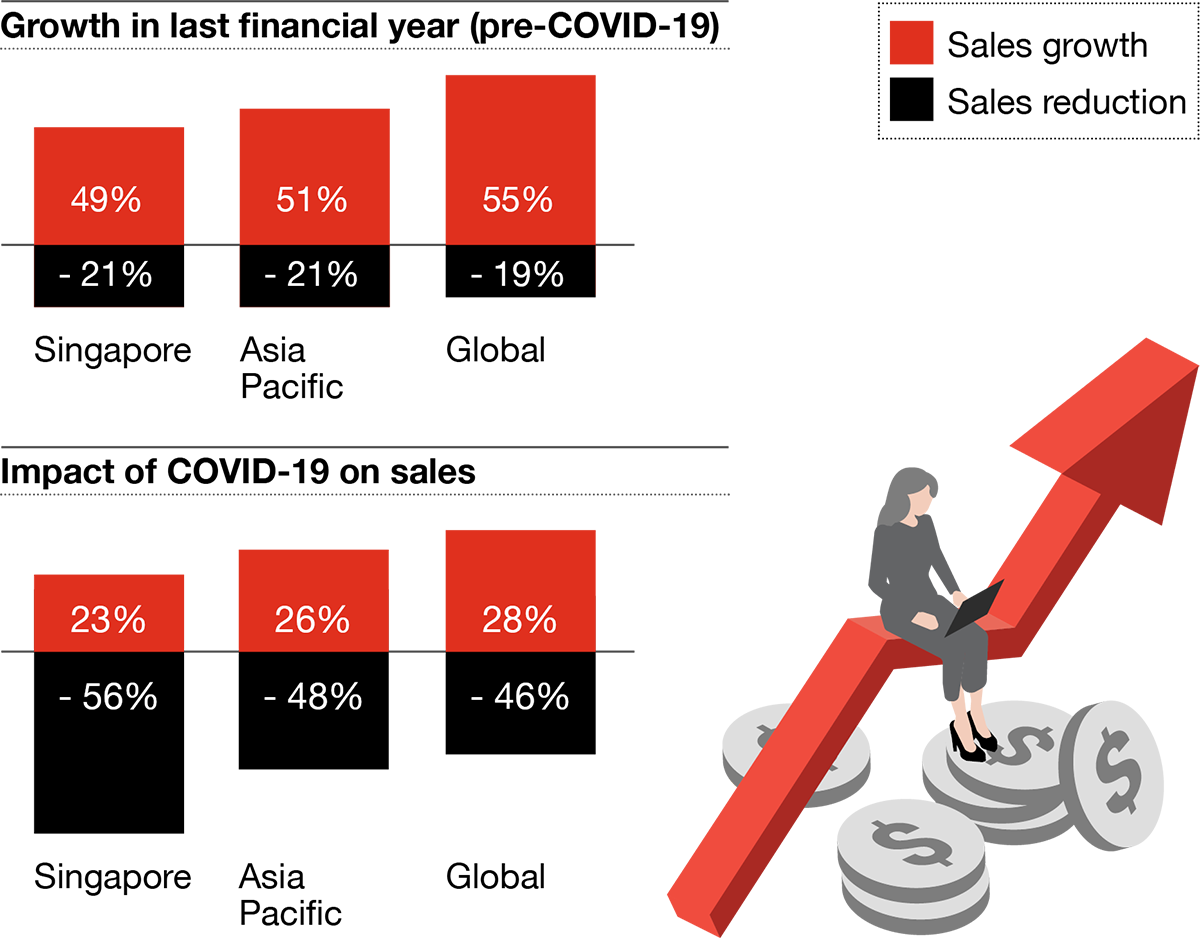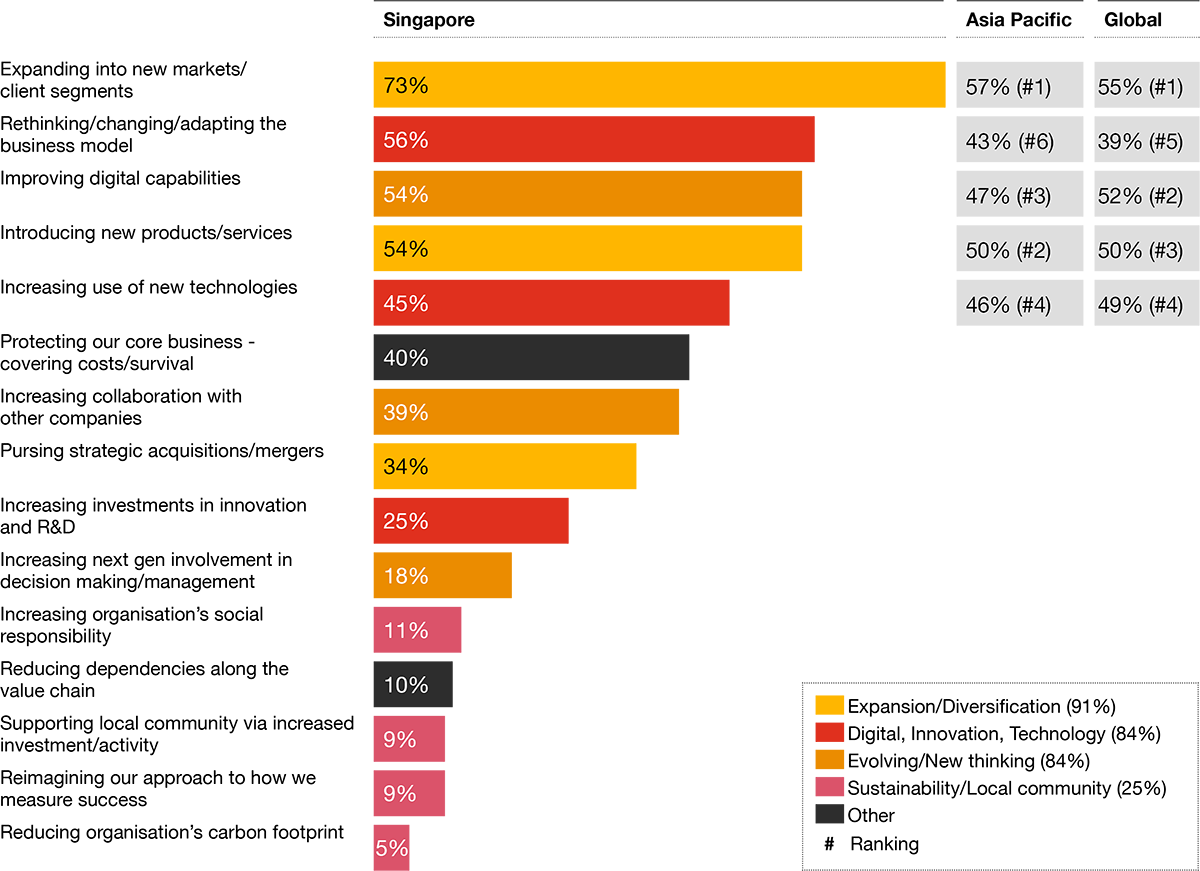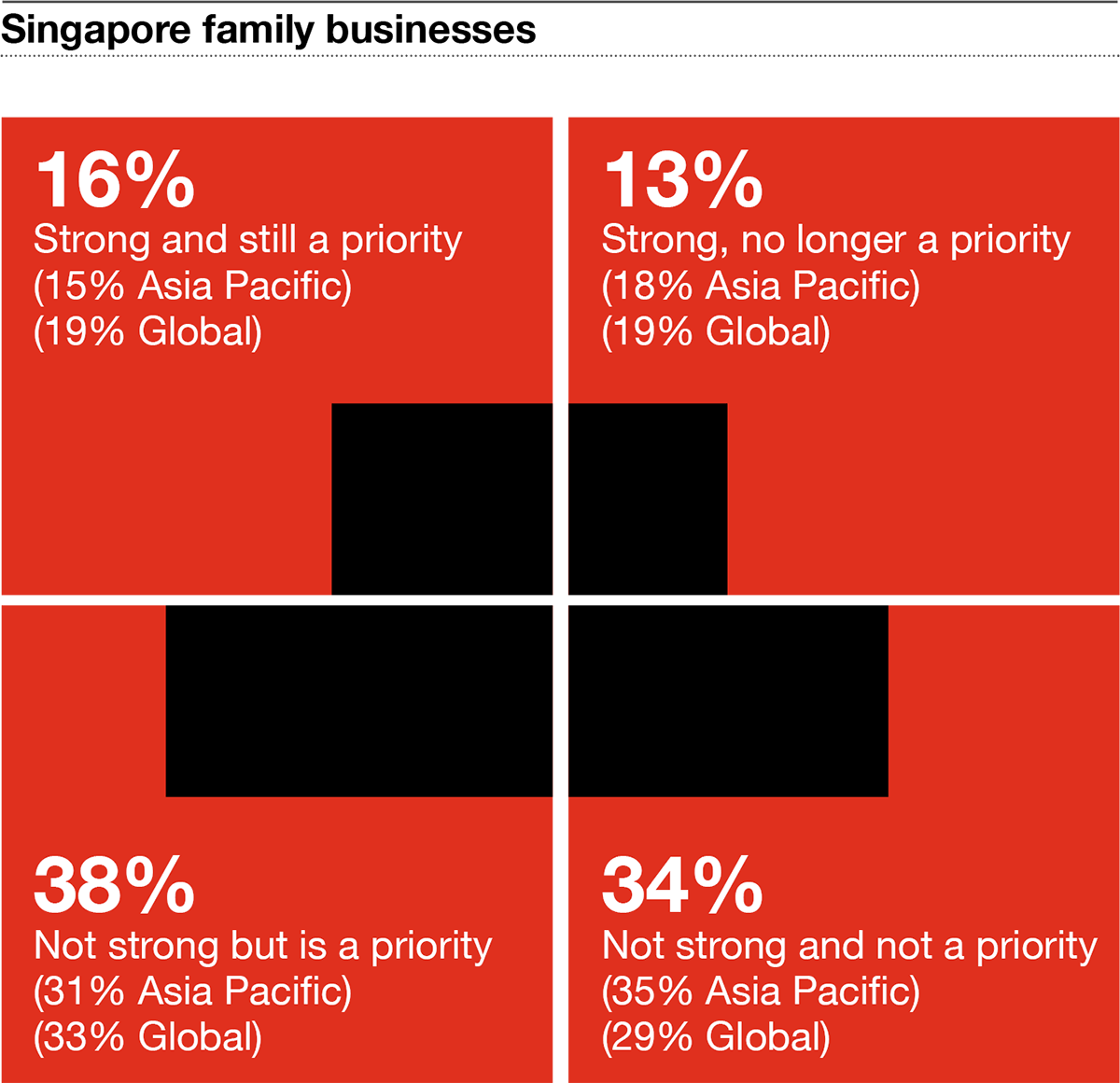{{item.title}}
{{item.text}}

{{item.text}}
The world is changing and so is the winning formula for long lasting family business success. To thrive in today’s world, Singapore family businesses require a change of mindset, a rethinking of priorities and behaviours, including heightened investment in the digital tools needed for continued economic resilience and more importantly, a new definition of legacy.
Our 10th PwC Global Family Business Survey unearthed the current thinking and future outlook of 2801 family business leaders across 87 territories, of which 80 were from Singapore, representing a diverse mix of businesses and industries. Our findings show it’s no longer enough for family businesses to piggyback on values and legacy to propel the business forward.
Singapore’s family businesses of tomorrow must embrace a new approach, one that is based on accelerated digital transformation, professional family governance and an impending prioritisation of sustainability goals. Indeed, they have been ‘giving back’ to society, but for them to make a positive impact today and ensure a legacy for future generations, alignment of profits with purpose is key. Family business leaders must demonstrate their environmental, social and corporate governance (ESG) credentials with concrete actions. It’s a business imperative today.
For family businesses, the time to act is now.
“The survey results this year aren’t very different from the findings in the previous years. Perhaps that’s worth noting, as it does indicate that family businesses aren’t thinking much differently despite the world of business being set upside down by the pandemic. It’s time for sustainability transformation to take centre stage, even as local family businesses keep their focus on diversification, expansion and digitalisation.”
Singapore family businesses have seen a mixed performance over the last financial year (pre-Covid-19), with 49% experiencing growth and 21% seeing reduction in sales. This is slightly less positive than the scene globally and in Asia Pacific where the majority of family businesses experienced higher growth (Exhibit 1). More than half the Singapore family businesses (56%) expect reduction in sales due to COVID-19, compared to 48% in APAC and 46% globally.
However, Singapore’s future growth aims are ambitious compared to their global and Asia Pacific counterparts, with 90% expecting growth to surge in 2022 (Exhibit 2). The outlook for 2021 is albeit cautious as 64% of Singapore family businesses expect to see growth, much in line with family businesses in Asia Pacific and worldwide.
Singapore family businesses will need to demonstrate added resilience as they chart their recovery and stay on course to meet their growth targets. Those that will rethink, reconfigure and re-start with new business models aligned with new world dynamics, will be in an optimal position to seize the new opportunities when the global economy reopens.
Top priorities facing Singapore family businesses over the next two years are expanding into new markets/client segments, rethinking/changing/adapting the business model, improving digital capabilities, introducing new products/services and increasing use of new technologies (Exhibit 3). The priorities of the local family business leaders resonate with business priorities of their counterparts in Asia Pacific and beyond. However, issues related to sustainability remain at the bottom of the priority list of Singapore family businesses (25%) as well as those in the Asia Pacific region (30%). This is considerably lower compared to Europe (47%) and the UK (54%).
The Government has recently announced Singapore Green Plan 2030, to work towards a low-carbon economy. Businesses, big or small and across industries, must align and start incorporating ESG into their business strategy. The time to embark on the ESG transformation journey is now, and Singapore family businesses must ensure they are not left behind.
Despite digital being on the business agenda in recent years, Singapore family businesses have made slow progress as only 29% say their digital capabilities are strong, which is comparatively lower to Asia Pacific (33%) and globally (38%). Only 16% of these local family businesses say their digital journey is complete (Exhibit 4).
This is despite their adaptability and agility consciousness, as the majority of them believe they have strong leadership teams (56%), clear and flat governance structure (54%), with clear roles and responsibilities for those involved in running the business (Exhibit 5). Most Singapore family businesses are yet to have the digital tools and capabilities required for a rapidly changing world. Key reasons could be the high costs of implementation, inadequate internal digital infrastructure and the skills shortage. Our 2019 NextGen Survey found that younger family members see technology as one of the three most important drivers of change, and 97% of local NextGens felt this was the area where they could add value in developing a strategy fit for the digital age. But more is yet to be done.
Just under three fifth of Singapore family businesses feel they have a clear sense of company and/or family values and these values have helped a clear majority during the COVID-19 pandemic. Only 40% have their values and company mission articulated in written form and only 26% have documented a succession plan (Exhibit 6).
The very relationships that make a family business strong can also hold it back. It’s a difficult subject for many, but introducing a more professionalised approach to governance takes emotion out of the equation and correlates with business success.
Most Singapore family businesses engage in some form of social responsibility activities, largely in terms of contributions to the local community or traditional forms of philanthropy. However, only a third have developed a sustainability strategy even as half of them see an opportunity to lead the way in sustainable business practices (Exhibit 7).
The sustainability agenda is yet to gather steam among local family businesses. One reason is that family businesses are still away from investor pressure on putting ESG at the heart of their long term plans for commercial success.
Our Family Business Survey 2021 report mirrors PwC’s 24th Annual Global CEO Survey findings which revealed a rebound in CEOs’ confidence in global economic growth as well as their own company’s revenue prospects. Singapore respondents in both surveys are seen prioritising investments in digitisation and expansion, but notably to a lesser extent, in climate change.
The overall survey findings are positive, yet it's like a wakeup call for most Singapore family businesses. Their financial resilience may make them well-placed to succeed in the near term, but they must readjust strategies and transform business models to power their post-pandemic recovery and growth in the longer term. Embracing emerging technologies and tighter family governance are key imperatives. Moreover, they must revisit their purpose and chart out concrete action plans to deliver on measurable non-financial impact.
{{item.text}}

{{item.text}}

Ng Siew Quan
Asia Pacific Leader, Entrepreneurial and Private Business, PwC Singapore
Tel: +65 9726 9880







